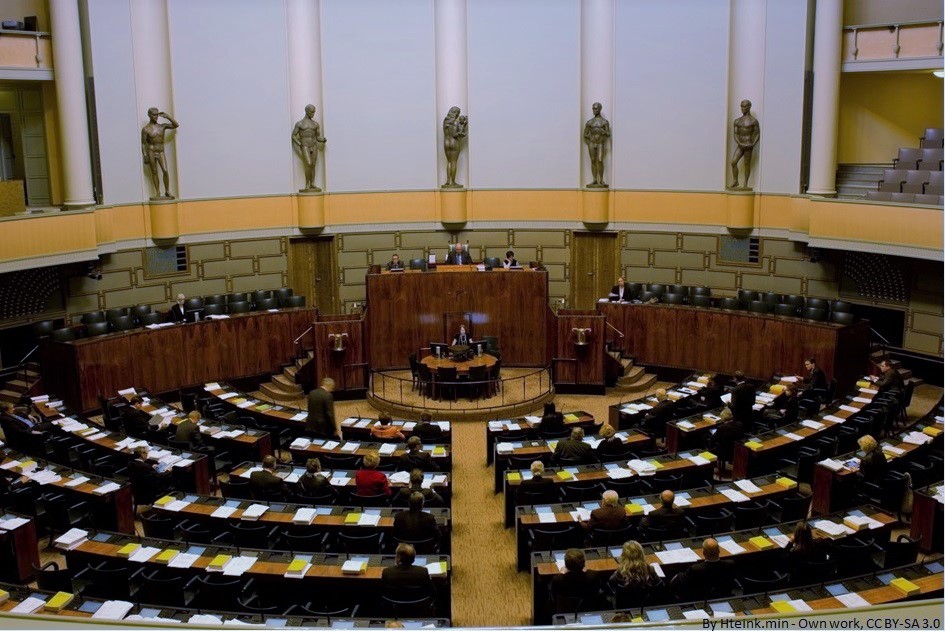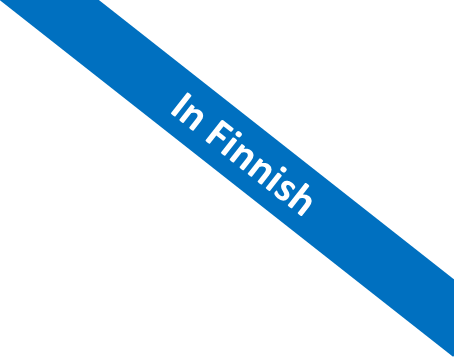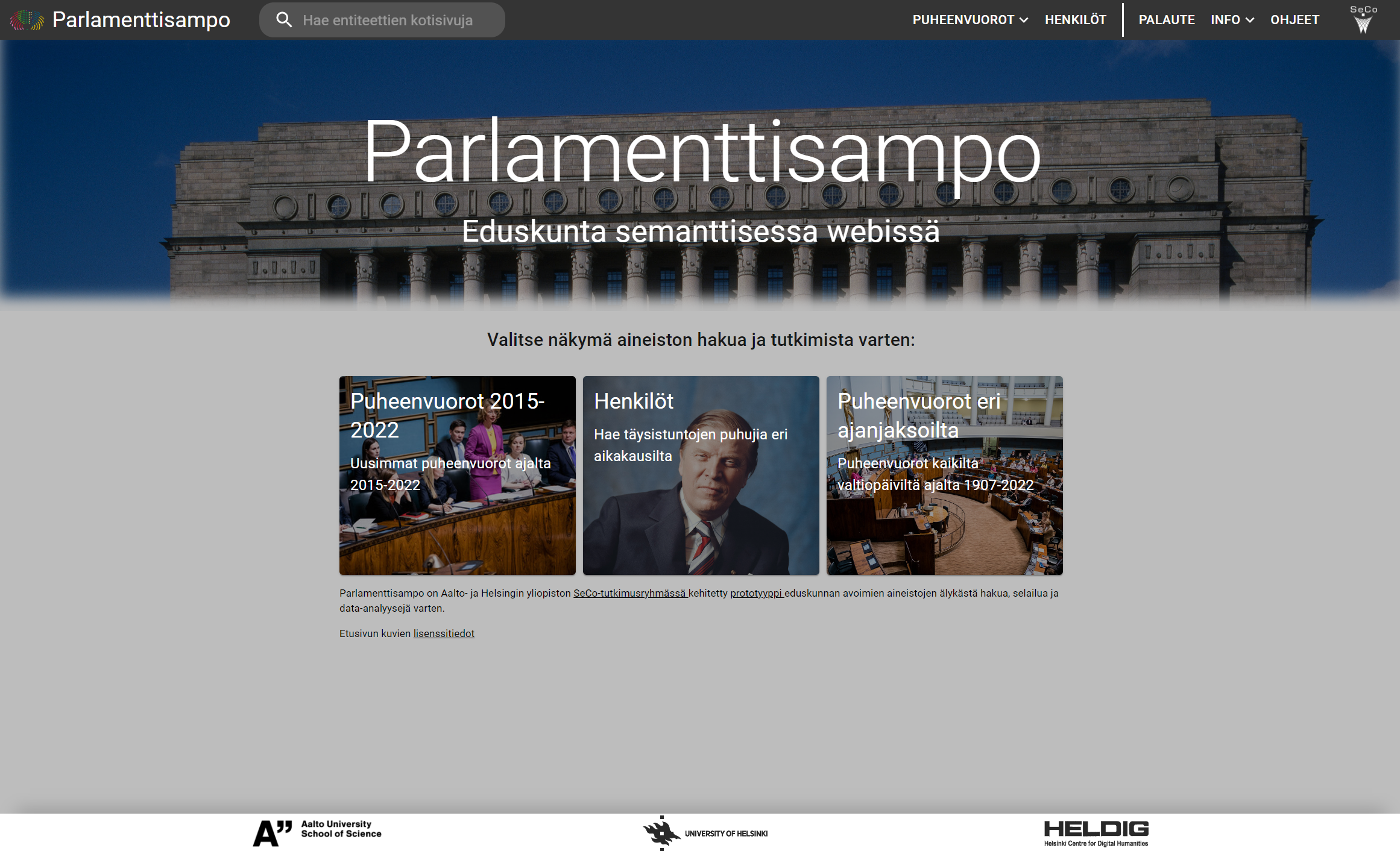 |
ParliamentSampo
Parliament of Finland on the Semantic Web |
 |
ParliamentSampo Linked Open Data service and the semantic portal
Parlamenttisampo.fi
were released for open use on February 14th, 2023. More information about the ParliamentSampo system can be found below:

ParliamentSampo portal landing page with application perspectives to speeches and people
Project Idea
ParliamentSampo is a linked open data research infrastructure of Finnish parliamentary data based on some million speeches
extracted from the minutes of the plenary sessions of the Parliament of Finland (PoF).
This data was interlinked with an ontology of actors, organizations, and events of the PoF that was created in a data-driven fashion from
open databases of the PoF, the Government, and enriched using Wikidata and the BiographySampo system.
ParliamentSampo was developed at the Aalto University and University of Helsinki (HELDIG Centre for Digital Humanities) using novel
semantic computing technologies to study parliamentary politics and political culture.
Developing ParliamentSampo was part of the Semantic Parliament consortium research project, funded by the Academy of Finland in 2020-2022 as part of the
DIGIHUM 2020-2022 programme on Digital Humanities.
The project brought together researchers at the University of Helsinki, Aalto University, and University of Turku, Center for Parliamentary Studies, with complementary,
multi-disciplinary expertise in language technology, semantic computing and web technologies, and political and media research, respectively.
The video below gives an introduction to the Semantic Parliament project as well as the ParliamentSampo system.
hyvonen-parliamentsampo-2021-03-04 from SeCo Research Group on Vimeo.
The other video gives an introduction to the Members of Parliament Knowledge Graph and Data Service.
Members of Parliament in Finland, Knowledge Graph and its Linked Open Data Service from SeCo Research Group on Vimeo.
Results of the Project
Results of the project were presented at the Final Seminar of the DIGIHUM Program on Nov 10, 2022, as overviewed in the video presentation below:
ParliamentSampo datasets, data servises, and the in-use portal Parlamenttisampo.fi
were officially published on February 14, 2023, at this seminar.
The key ideas and major features of ParliamentSampo are presented in this
paper of the DiPaDa 2022 conference.
A more technical description about the ParliamentSampo infrastructure and its parts
can be found in this
article.
More information about this project is available at the Finnish
homepage and in the publications below.
How to Refer to the ParliamentSampo system
The most comprehensive presentation of the ParliamentSampo system as a whole is this paper:
Eero Hyvönen, Laura Sinikallio, Petri Leskinen, Senka Drobac, Rafael Leal, Matti La Mela, Jouni Tuominen, Henna Poikkimäki and Heikki Rantala: Publishing and Using Parliamentary Linked Data on the Semantic Web: ParliamentSampo System for Parliament of Finland. Semantic Web, 2024. DOI: 10.3233/SW-243683
The papers below focus on different parts and aspects of the system in more detail.
-
Professor Eero Hyvönen, University of Helsinki (HELDIG) and Aalto University.
Project consortium leader and the Principal Investigator (PI) at the University of Helsinki (HELDIG).
-
Staff Scientist, Dr. Jouni Tuominen, Aalto University and HELDIG.
PI at Aalto University.
-
Adjunct Professor Kimmo Elo, University of Turku, Centre for Parliamentaty Studies.
PI at the University of Turku.
The project steering committee includes, in addition to the PIs above, Matti La Mela (Aalto), Ari Apilo (Parliament of Finland), Sari Wilenius (Parliament of Finland)
ja Aki Hietanen (Ministry of Justice).
The project also has an Intenational Advisory Board:
Dr. Laura Hollink (CWI, Centrum Wikunde & Informatica, Amsterdam),
Prof. Bruno Martins (University of Lisbon), and
Prof. Andra Siibak (University of Tartu, Estonia, Institute of Social Studies).
Publications
2025
Eero Hyvönen, Annastiina Ahola, Petri Leskinen and Jouni Tuominen:
SampoSampo: A Portal for Studying Enriched Data and Semantic Connections on a Cultural Heritage Linked Open Data Cloud.
The Semantic Web: ESWC 2025 Satellite Events, Portoroz, Slovenia, June 1 - 5, 2025, Proceedings, Springer-Verlag, 2025. Accepted, forth-coming.
bib pdf 2024
Tomaž Erjavec, Matyáš Kopp, Nikola Ljubešić, Taja Kuzman, Paul Rayson, Petya Osenova, Maciej Ogrodniczuk, Çağrı Çöltekin, Danijel Koržinek, Katja Meden, Jure Skubic, Peter Rupnik, Tommaso Agnoloni, José Aires, Starkaður Barkarson, Roberto Bartolini, Núria Bel, María Calzada Pérez, Roberts Darģis, Sascha Diwersy, Maria Gavriilidou, Ruben van Heusden, Mikel Iruskieta, Neeme Kahusk, Anna Kryvenko, Noémi Ligeti-Nagy, Carmen Magariños, Martin Mölder, Costanza Navarretta, Kiril Simov, Lars Magne Tungland, Jouni Tuominen, John Vidler, Adina Ioana Vladu, Tanja Wissik, Väinö Yrjänäinen and and Darja Fišer:
ParlaMint II: Advancing Comparable Parliamentary Corpora Across Europe. Language Resources and Evaluation, 2024.
bib pdf link Eero Hyvönen, Laura Sinikallio, Petri Leskinen, Senka Drobac, Rafael Leal, Matti La Mela, Jouni Tuominen, Henna Poikkimäki and Heikki Rantala:
Publishing and Using Parliamentary Linked Data on the Semantic Web: ParliamentSampo System for Parliament of Finland. Semantic Web, pp. Pre-Press, 1-23, November, 2024. DOI: 10.3233/SW-243683.
bib pdf link 2023
Eero Hyvönen, Laura Sinikallio, Petri Leskinen, Senka Drobac, Rafael Leal, Matti La Mela, Jouni Tuominen, Henna Poikkimäki and Heikki Rantala:
Plenary Speeches of the Parliament of Finland as Linked Open Data and Data Services.
Joint Proceedings of the Second International Workshop on Knowledge Graph Generation From Text and the First International BiKE Challenge co-located with 20th Extended Semantic Conference (ESWC 2023), pp. 1-20, CEUR Workshop Proceedings, Vol. 3447, August, 2023.
bib pdf link Eero Hyvönen, Petri Leskinen, Laura Sinikallio, Senka Drobac, Rafael Leal, Matti La Mela, Jouni Tuominen, Henna Poikkimäki and Heikki Rantala:
ParliamentSampo Infrastructure for Publishing the Plenary Speeches and Networks of Politicians of the Parliament of Finland as Open Data Services. Aalto University, Dept. of Computer Science, February, 2023. Paper published at the publication event of the ParliamentSampo data service and portal.
bib pdf 2022
Eero Hyvönen, Laura Sinikallio, Petri Leskinen, Matti La Mela, Jouni Tuominen, Kimmo Elo, Senka Drobac, Mikko Koho, Esko Ikkala, Minna Tamper, Rafael Leal and Joonas Kesäniemi:
Linked Data Approach for Studying Parliamentary Speeches and Networks of Politicians in Finland 1907-2021 (long paper).
Digital Humanities 2022, Conference Abstracts, July 25-29, 2022 Online, Tokyo. Japan, University of Tokyo, pp. 254-257, ADHO, July, 2022.
bib link Minna Tamper, Rafael Leal, Laura Sinikallio, Petri Leskinen, Jouni Tuominen and Eero Hyvönen:
Extracting Knowledge from Parliamentary Debates for Studying Political Culture and Language.
Proceedings of the 1st International Workshop on Knowledge Graph Generation From Text and the 1st International Workshop on Modular Knowledge co-located with 19th Extended Semantic Conference (ESWC 2022) (Sanju Tiwari, Nandana Mihindukulasooriya, Francesco Osborne, Dimitris Kontokostas, Jennifer D’Souza and Mayank Kejriwal (eds.)), vol. 3184, pp. 70-79, CEUR WS, May, 2022. International Workshop on Knowledge Graph Generation from Text (TEXT2KG 2022).
bib pdf link Eero Hyvönen, Laura Sinikallio, Petri Leskinen, Matti La Mela, Jouni Tuominen, Kimmo Elo, Senka Drobac, Mikko Koho, Esko Ikkala, Minna Tamper, Rafael Leal and Joonas Kesäniemi:
Finnish Parliament on the Semantic Web: Using ParliamentSampo Data Service and Semantic Portal for Studying Political Culture and Language.
Digital Parliamentary data in Action (DiPaDA 2022), Workshop at the 6th Digital Humanities in Nordic and Baltic Countries Conference, long paper, pp. 69-85, CEUR Workshop Proceedings, Vol. 3133, May, 2022.
bib pdf link Esko Ikkala, Eero Hyvönen, Heikki Rantala and Mikko Koho:
Sampo-UI: A Full Stack JavaScript Framework for Developing Semantic Portal User Interfaces. Semantic Web – Interoperability, Usability, Applicability, vol. 13, no. 1, pp. 69-84, January, 2022. Online version published in 2021, print version in 2022.
bib pdf link 2021
Eero Hyvönen, Laura Sinikallio, Petri Leskinen, Senka Drobac, Jouni Tuominen, Kimmo Elo, Matti La Mela, Mikko Koho, Esko Ikkala, Minna Tamper, Rafael Leal and Joonas Kesäniemi:
Parlamenttisampo: eduskunnan aineistojen linkitetyn avoimen datan palvelu ja sen käyttömahdollisuudet. Informaatiotutkimus, vol. 40, no. 3, pp. 216-244, November, 2021.
bib pdf link Laura Sinikallio, Senka Drobac, Minna Tamper, Rafael Leal, Mikko Koho, Jouni Tuominen, Matti La Mela and Eero Hyvönen:
Plenary Debates of the Parliament of Finland as Linked Open Data and in Parla-CLARIN Markup.
3rd Conference on Language, Data and Knowledge, LDK 2021, Open Access Series in Informatics (OASIcs), vol. 93, pp. 8:1-8:17, Schloss Dagstuhl - Leibniz-Zentrum für Informatik GmbH, Zaragoza, Spain, August, 2021.
bib pdf link Kimmo Kettunen and Matti La Mela:
Semantic tagging and the Nordic tradition of Everyman’s rights. Digital Scholarship in the Humanities (DSH), pp. preprint, Oxford University Press, April, 2021. Accepted.
bib pdf This article uses semantic tagging to analyse the Nordic concept of everyman’s rights (a right of public access to nature) in protocols of the Finnish parliament. In the analysis, we use a novel tool, a lexical semantic tagger for Finnish (FiST), which is used to tag key discussions about everyman’s rights in the Finnish parliament. The article has two contributions: first, it presents a method which combines semantic tagging and similarity analysis of corpora (keyness) for studying the formation of political concepts in large textual data. Second, it sheds light on the Nordic access rights and the underlying customary everyman’s rights. Despite its central role in public debate, the history of the concept has not been well researched. Our analysis shows that the legislative context could be clearly detected with our approach, and that the method allowed us to describe shifts in the meaning of everyman’s rights in the legislative discussion.
2020





